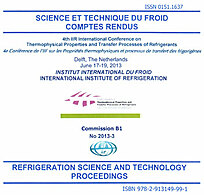
Document IIF
Étude expérimentale d'un coulis d'hydrates de semi-clathrates dans un échangeur de chaleur à serpentin.
Experimental study of semi-clathrate hydrate slurry in a coil heat exchanger.
Numéro : pap. n. TP-026
Auteurs : VASILESCU C., INFANTE FERREIRA C.
Résumé
Air conditioning systems represent a large percentage of energy consumption and greenhouse gases emissions of the building sector. The distribution of cold of these systems could be improved by using two-phase fluids which are more energy efficient because of the latent heat of the solid/liquid phase change. Recently several quaternary salts such as tetrabutylammonium bromide (TBAB) have been proposed for air conditioning applications because their phase change takes place at atmospheric pressure and temperatures above the freezing point of water. This paper is concerned with the experimental analysis of a coil heat exchanger with 6 mm internal diameter with TBAB hydrate slurry.A mixture of 36.5 wt % TBAB and water is cooled at temperatures from 15°C to 10°C until the hydrates forming conditions are reached. The temperature raises when hydrates appear. The pressure drop starts to increase when the hydrates are formed because of the increased viscosity of the fluid. Heat transfer coefficients and pressure drops of 25-45 wt % TBAB hydrate slurry are presented. Local heat transfer correlations are derived from the experiments.
Documents disponibles
Format PDF
Pages : 8 p.
Disponible
Prix public
20 €
Prix membre*
Gratuit
* meilleur tarif applicable selon le type d'adhésion (voir le détail des avantages des adhésions individuelles et collectives)
Détails
- Titre original : Experimental study of semi-clathrate hydrate slurry in a coil heat exchanger.
- Identifiant de la fiche : 30008103
- Langues : Anglais
- Source : 4th IIR Conference on Thermophysical Properties and Transfer Processes of Refrigerants
- Date d'édition : 17/06/2013
Liens
Voir d'autres communications du même compte rendu (69)
Voir le compte rendu de la conférence
-
Design of a fluidized bed heat exchanger for CO...
- Auteurs : ZHOU H., INFANTE FERREIRA C.
- Date : 17/06/2013
- Langues : Anglais
- Source : 4th IIR Conference on Thermophysical Properties and Transfer Processes of Refrigerants
- Formats : PDF
Voir la fiche
-
Heat transfer and flow characteristics during t...
- Auteurs : ZHOU H., INFANTE FERREIRA C. A.
- Date : 02/08/2014
- Langues : Anglais
- Source : 11th IIR Gustav Lorentzen Conference on Natural Refrigerants (GL2014). Proceedings. Hangzhou, China, August 31-September 2, 2014.
- Formats : PDF
Voir la fiche
-
Measurement of thermal conductivity of TBAB CHS...
- Auteurs : ZHANG P., MA Z. W.
- Date : 01/07/2012
- Langues : Anglais
- Source : 10th International Conference on Phase-Change Materials and Slurries for Refrigeration and Air Conditioning. Proceedings: Kobe, Japan, July 29-August 1, 2012.
- Formats : PDF
Voir la fiche
-
Ice adhesion in the ice slurry production process.
- Auteurs : FRANK S., ÁLVAREZ PARDINAS Á., KIND M., et al.
- Date : 21/08/2011
- Langues : Anglais
- Source : Proceedings of the 23rd IIR International Congress of Refrigeration: Prague, Czech Republic, August 21-26, 2011. Overarching theme: Refrigeration for Sustainable Development.
- Formats : PDF
Voir la fiche
-
Numerical simulation of ice slurry flow in impr...
- Auteurs : HEFNY S., THOMAS C., HESSE U.
- Date : 05/2021
- Langues : Anglais
- Source : 2021 Purdue Conferences. 18th International Refrigeration and Air-Conditioning Conference at Purdue.
- Formats : PDF
Voir la fiche
